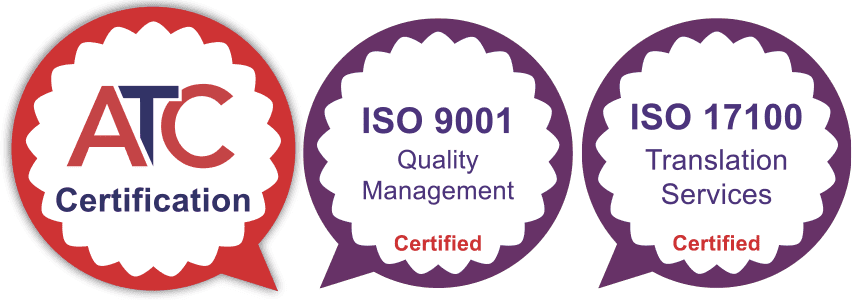
Learn what ISO certification is, how it applies to you and your translation agency, and 4 questions you should ask when interviewing a potential agency for your company.
Learn About Translation ISO Certifications
Translating marketing, training, and other business materials for a multilingual audience is vital to a company’s success. It can also prove that you embrace the growth opportunities afforded by putting your message in front of a multilingual audience.
But be warned – not all translation services are the same. Maybe you’ve been burned by poor translations, documents riddled with errors, or projects that stretched past the deadline and exceeded your initial budgets.
Before rolling the dice on a new translation partner, find out if they are as dedicated to quality as you are. An ISO certification helps ensure the company makes significant investments in committing to quality, continuous improvement, and client satisfaction.
Frequently Asked Questions About ISO-Certified Translation Companies
We will answer these questions in the article:
- What is ISO certification?
- What ISO certifications should I look for in a translation agency?
- Isn’t a translation ISO certification enough?
- Why should I choose an ISO-certified translation company?
- What should I ask when interviewing a translation provider?
What is an ISO Certification?
ISO, the International Organization for Standardization, has developed over 23,874 market-relevant international standards supporting innovation and providing solutions to global challenges for businesses in a multitude of industries.
Working to meet the requirements within ISO standards can help companies achieve consistent results and continually improve their business processes through a commitment to quality and good business practices. ISO-certified organizations are audited annually to ensure that the ISO standards to which they are certified continue to be adhered to.
According to the ISO website, “standards are the distilled wisdom of people with expertise in their subject matter and who know the needs of the organizations they represent – people such as manufacturers, sellers, buyers, customers, trade associations, users or regulators.”
ISO Standards for Translation Companies
When considering translation companies, there are two ISO standards that are especially relevant:
- ISO 9001:2015 Quality Management Systems
- ISO 17100:2015 Translation Services
Interpro Translation Solutions’ ISO Certification Badges
Interpro Translation Solutions has been awarded both certifications, but translation agencies can opt to hold both, one, or neither of these certifications. We feel that adhering to the requirements of both standards shows our commitment to consistently delivering quality translations.
ISO 9001:2015 (Quality Management)
ISO 9001 is the world’s best-known quality management standard for organizations of any size.
It’s confirmation that a company has the processes in place and a demonstrated ability to consistently deliver high-quality products and services to meet or exceed customer expectations for satisfaction.
To obtain – and maintain – certification, auditors assess the company on requirements that support these core principles:
- Customer focus
- Leadership
- Engagement of people
- Process approach
- Improvement
- Evidence-based decision making
- Relationship management
Additional business aspects covered by the ISO 9001 standard include:
- Identifying, correcting, and preventing errors
- Planning, operating, documenting, and controlling company processes
- Collecting customer feedback and implementing suggestions for improvement
- Awareness and effective management of business risks and opportunities
ISO 17100:2015 (Translation Services)
ISO 17100 provides requirements for the core processes, resources, and other aspects necessary for delivering a quality translation service. All translators, revisers, and proofreaders working for a certified agency must meet minimum professional and academic qualifications. The standard also defines how translation projects should be managed from beginning to end.
ISO 17100 includes provisions for:
- Qualifications and competencies of linguistic resources
- Pre-production, such as quotes, agreements, and contracts
- Production, including translation, revision, proofreading, and quality control
- Post-production, including customer feedback, corrections, and satisfaction
The ISO 17100:2015 certification offers confidence that the translation company you choose only uses suitably qualified linguistic resources, providing more consistent quality outcomes for each translation project.
We get asked: Why isn’t ISO 17100 Certification enough for a translation service? Does your translation agency have to have an ISO 9001 Certification for quality as well?
Short answer? No, they don’t have to be certified to both standards. Technically, they don’t have to be certified to any standard.
However, Interpro is certified to both ISO 9001 and ISO 17100 standards because our leadership team feels strongly that adhering to both ISO Standards supports our business mission. Interpro consistently delivers high-quality translations and continuously improves for total client satisfaction.
The Benefits of Choosing an ISO-Certified Translation Company
Customer satisfaction is the ultimate objective of ISO certification. During annual third-party audits, a company must demonstrate that it adheres to each of the requirements within the standard by showing evidence to the auditor.
The Quality Management standard requires companies to develop a systematic approach that drives quality across all departments, levels, and processes. Every department is held to the same high standards, from the translators to the business office to customer service.
“Probably the most critical aspect of working toward certification was our team’s enthusiastic support to adhere to the standards and to constantly strive to improve the ways in which we do our jobs,” said Interpro Founder and CEO Ralph Strozza. “We are constantly documenting and updating processes, developing new processes, and reviewing every aspect of our Integrated Management System.”
ISO certification motivates and encourages translation service providers like Interpro to constantly improve in order to arrive at more efficient solutions.
It’s not enough to do the job well; we have to prove we can do it consistently and reliably.
For clients, that means peace of mind: not only can you trust that the quality of the translated content will be superior, but you can also trust it will be delivered when promised.
“Our ISO certification positions Interpro to deliver real quality to our clients successfully and to best serve interested parties for many years to come,” Ralph said.
Continuous improvement is a hallmark of ISO certification. Working with an ISO-certified translation company means you can be confident that they strive to adhere to the standards. More importantly, you know there is a process to address any possible issues that could arise and that a corrective action plan will be deployed to ensure the issues don’t repeat.
Translation Standards in the Language Industry
You may come across translation agencies using terms like “ISO compliant” or “certified translations.” This is not the same as being ISO certified.
“ISO compliant” means adhering to the requirements of ISO standards without the formalized certification, surveillance, and recertification processes. Companies who claim to be ISO compliant are saying they will do their best, but make no guarantees. The client can’t be sure that rigorous ISO standards are consistently adhered to across the board.
“Certified translations” is a somewhat murky term. There are several organizations that certify individual translators, such as the American Translators Association and the International Federation of Translators. Many of these organizations require passing stringent exams in order to become certified.
These certifications are held by individual translators, not the company, and not their processes as a whole. ISO certification applies to the entire translation process, ensuring everyone involved (your account executive, project manager, translator, billing agent, etc.) is held to the same high standard.
Key things an ISO-certified translation company will do that an uncertified company may not, include:
- Annual audit by an independent party to assess whether translation, revision, and proofreading services are delivered in accordance with the ISO standards to which they are certified;
- Resolving the root cause of issues and deploying corrective action plans in order to make sure they don’t repeat;
- Having documented processes for every functional area of the organization;
- Soliciting and tracking client feedback.
4 Questions to Ask Your Translation Provider
When interviewing translation service providers, you may not know how to gauge the quality of their service. Start with the following questions:
1. Was your company awarded ISO certification by a recognized ISO certification body for quality management and translation services?
The company should hold ISO 17100:2015 (Translation Services) or ISO 9001:2015 (Quality Management) Certifications at a minimum. These ISO certifications offer independent verification that the company follows processes to ensure quality and customer satisfaction for translation services. You can also verify if they are ISO certified by searching for them on their ISO certification body’s website. Additionally, they should be able to provide their certificates on demand, or ideally, make them available and downloadable from their website. View Interpro Translation Solutions’ certificates for ISO 9001:2015 (Quality Management) and ISO 17100:2015 (Translation Services).
2. Do you use Machine Translation (MT) to translate content?
If a translation agency is offering Machine Translation (MT), make sure that they are certified to ISO 18587, which provides for the process of full, human post-editing of machine translation output and post-editors’ competencies.
Some translation providers use MT and MT processes based on AI to translate content without post-editing but don’t disclose that unless they’re specifically asked. But MT is notoriously known for being inaccurate. Using AI-based MT alone to translate may also result in a higher level of errors in the target-language product. If a company is using MT, but doesn’t involve human post-editing through revision and proofreading processes, that’s a red flag. Most translation companies that use MT do so in order to save money and deliver faster. It is extremely unethical if the client is paying for professional human translation, and their translation provider does not disclose that they are using MT.
3. Describe your standard Quality Assurance workflow.
You want to know that the company follows a process not just for the translation, revision, and proofreading of your material, but also to ensure total quality through quality control and quality assurance. They should be able to explain their complete workflow step by step and if they can’t, that’s another red flag.
4. Does your quote include proofreading, revision, and final Quality Assurance?
Be sure you know exactly which services are included in the quotation provided to you. An ISO certified translation company is required by the standard to be transparent in disclosing all of the services included in their quotations.
High-quality professional translation opens the door to global business growth – whether you’re translating a website, an eLearning course, or employee training materials. ISO certification demonstrates that a translation provider is committed to delivering a great experience to both you and your audience.
Translation Agency with ISO Certifications
Professionals can find a foreign language partner in Interpro Translation Solutions. No matter the project size, languages, or deadlines, Interpro has an expert team to meet your translation needs.
References
International Organization for Standardization
ISO 9001:2015 Quality Management Systems
ISO 17100:2015 Translation Services
Category: Translation
Don't forget to share this post!
Stay Updated with Interpro
Subscribe to our newsletter for the latest updates and insights in translation and localization.








